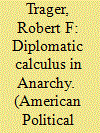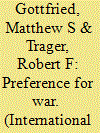|
|
|
Sort Order |
|
|
|
Items / Page
|
|
|
|
|
|
|
| Srl | Item |
| 1 |
ID:
068264


|
|
|
| 2 |
ID:
097022


|
|
|
|
|
| Publication |
2010.
|
| Summary/Abstract |
When states come to believe that other states are hostile to their interests, they often reorient their foreign policies by realigning alliance commitments, building arms, striking first, mobilizing troops, or adopting policies to drain the resources of states that menace them. This article presents a crisis bargaining model that allows threatened states a wider array of responses than the choice to back down or not. Two implications are that (1) "cheap talk" diplomatic statements by adversaries can affect perceptions of intentions, and (2) war can occur because resolved states decline to communicate their intentions, even though they could, and even though doing so would avoid a war. The model relates the content and quality of diplomatic signals to the context of prior beliefs about intentions and strategic options. In simulations, this form of diplomatic communication reduces the likelihood of conflict.
|
|
|
|
|
|
|
|
|
|
|
|
|
|
|
|
| 3 |
ID:
188884


|
|
|
|
|
| Summary/Abstract |
Studies have shown that across time and place, women, on average, are less supportive of the use of force than men. This implies that extensions of the franchise to women provide an opportunity to evaluate theories of democratic constraint on foreign policy decision making. In this article, we theorize democratic constraint on war and peace, arguing that it is a common latent constraint on elite actions and an active constraint when one party is pre-committed to a foreign policy position. We use the extraordinary—yet unexplored—case of the 1916 US presidential election to identify the democratic constraint on foreign policy and of women’s votes in particular. This case represents an early step of women into the electoral realm at the national level and provides unique evidence of leader selection due to changes in public opinion because of the uneven extension of women’s suffrage to US states. Reelected on a platform of: “He kept the United States out of war,” Woodrow Wilson would fail to avoid war in Europe, but he did pursue cooperative policies with Mexico that very likely prevented a second Mexican-American war.
|
|
|
|
|
|
|
|
|
|
|
|
|
|
|
|
| 4 |
ID:
113334


|
|
|
|
|
| Publication |
2012.
|
| Summary/Abstract |
There is a large literature on the impacts of explicit threats on the outcomes of crises between states, but the longer-term impacts of threats on dyadic state relationships and on international outcomes have been much less studied because of the difficulty of establishing causal connections between events separated in time. By comparing nearly identical foreign policy contexts before and after the Austrian Crimean War ultimata to Russia, this article demonstrates that, contrary to the prevailing view in much of the international relations literature, such long-term effects are not marginal ones that theoretical simplification with the goal of analyzing the central tendencies of the international system can usefully ignore. Under conditions discussed below, when a state is threatened in a way that attempts to deny one of its key policy objectives, that state will be less likely to come to the aid of the threatening state in the future and more likely to join the other side in future wars, realign its alliance commitments, and adopt strategies to drain the resources of the threatening state. Among the implications of these findings are that policymakers should take greater account of the long-term consequences of aggressive negotiating stances than current theories imply and that scholars have underestimated the information conveyed by private threats in crisis bargaining.
|
|
|
|
|
|
|
|
|
|
|
|
|
|
|
|
| 5 |
ID:
106250


|
|
|
|
|
| Publication |
2011.
|
| Summary/Abstract |
States often negotiate with each other over more than one issue at the same time. This article presents a model of multidimensional international crisis bargaining. Unlike unidimensional bargaining, with two issue dimensions states can send costless signals about their resolve that have dramatic effects on other states' beliefs and actions. One reason is that when states claim a willingness to fight over an issue they in fact are not willing to fight over, they may lose the opportunity to get what they really want without conflict. As a result, when there is a chance that adversaries may each be willing to fight over two issues, the states can even sometimes convey with certainty when they will fight for both issues. The model also leads to some surprising comparative statics, for example, decreases in the probability that the target is willing to fight can increase the probability of war.
|
|
|
|
|
|
|
|
|
|
|
|
|
|
|
|
| 6 |
ID:
146197


|
|
|
|
|
| Summary/Abstract |
We conduct a survey experiment to examine the effects of international compromise, war, and foreign government rhetoric on presidential approval. We find that, in certain conflicts, popular approval tracks fairness heuristics—leaders seeking to maximize voter approval prefer equitable divisions of disputed goods and are risk acceptant for divisions below this threshold. Moreover, aggressive rhetoric by a foreign leader increases domestic leaders’ expected approval from war, decreases the value of compromise, and provides them with powerful incentives to fight harder. Thus, leaders motivated by popular approval have preferences that are inconsistent with the non-satiated, risk-averse preferences defined over shares of an objective good—that is, with those that much of the rationalist literature on conflict assumes. Fairness heuristics and the rhetorical framing of disputes during the conflict process may be at least as important as material factors in understanding why some disputes result in war.
|
|
|
|
|
|
|
|
|
|
|
|
|
|
|
|
| 7 |
ID:
188146


|
|
|
|
|
| Summary/Abstract |
In recent decades, governments have been ineffectual at regulating dangerous emerging technologies like lethal autonomous weapons and synthetic biology. In today’s era of great power competition, changing course is difficult but imperative. Four areas of technological development illustrate the generic problem of responding to innovation: the complexity of the analysis required to determine the best governance responses, the difficulties of building a consensus for action, and the urgent need for institutional frameworks that facilitate anticipatory rather than reactive regulation. The international community needs new, standing international governance frameworks to address this growing challenge.
|
|
|
|
|
|
|
|
|
|
|
|
|
|
|
|
| 8 |
ID:
167666


|
|
|
|
|
| Summary/Abstract |
How do the limitations of the American perspective in international relations (IR) affect the accuracy of theorizing? We show that assumptions about the relationship between domestic and international politics that underlie significant segments of American IR scholarship are unwarranted. Publics around the world do not respond to United Nations’ and other intergovernmental organizations’ criticism of their governments in the same way that Americans do. Publics are not universally poorly informed of their country's foreign policies, and they are not equally skeptical of the value of using force for resolving disputes with other states. We demonstrate the limitations of US-based scholarship using new and unique survey data from the United States and other countries. We then address how these US-centric assumptions skew certain IR literatures and limit important research agendas pursued by American scholars.
|
|
|
|
|
|
|
|
|
|
|
|
|
|
|
|
|
|
|
|
|